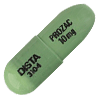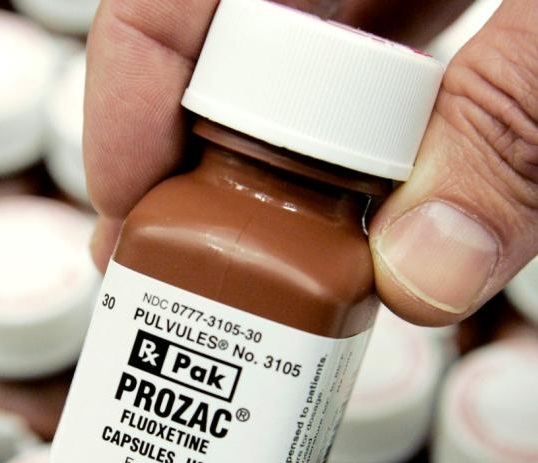Prozac (Fluoxetine Hydrochloride): Medical Uses, Six Key Facts You Need to Know, Contraindications and Side Effects, Interaction with Other Drugs, Overdose, How to Take and How to Stop Taking
CONTENT

- Medical Uses
- Six Key Facts You Need to Know About Prozac
- Before You Start Prozac Treatment
- Prozac and Other Drugs
- Intake with Food, Drink, and Alcohol
- Precautions
- Suicidal Thoughts and Worsening of Your Condition
- Taking Prozac During Pregnancy and Breast-Feeding
- Prozac and Men Fertility
- Use of Prozac in Children and Adolescents 8 to 18 years of Age
- Driving and operating machines
- Potential Side Effects
- How to Take Prozac
- Overdose
- Forgetting to Take Prozac
- How to Stop Taking Prozac
- How to Store
Prozac (fluoxetine hydrochloride), also known as Olena, Prozep, Oxactin, etc., is a popular antidepressant of the selective serotonin reuptake inhibitor (SSRI) class, administered orally. Selective serotonin reuptake inhibitors act by boosting the amount of a neurotransmitter, called serotonin, which is present in some parts of the brain.
Medical Uses
Prozac is commonly used for treating major depressive disorder cases, obsessive-compulsive disorder (OCD), as well as panic disorder, post-traumatic stress disorder (PTSD), trichotillomania, bulimia nervosa, and, sometimes, premenstrual dysphoric disorder. It has also been used to treat obesity, binge eating disorder (BED), cataplexy, as well as alcohol addiction. Prozac has been attempted, with moderate success, as a treatment for autism spectrum disorders.
Fluoxetine hydrochloride can come in different forms, for example:
- 10mg or 20mg dispersible tablets (may contain sorbitol; disintegrate in the mouth or can be mixed with water)
- 20mg or 60mg capsules (may contain gelatin or lactose)
- 20mg/5mL oral solution (liquid form)
Read this instruction carefully before taking Prozac since it contains critical information for your consideration.
Six Key Facts You Need to Know About Prozac
 Prozac may not start working straight away. Some patients taking antidepressants initially feel worse before they start feeling better. Arrange to visit your doctor in a couple of weeks after the date you launched your antidepressant treatment.
Prozac may not start working straight away. Some patients taking antidepressants initially feel worse before they start feeling better. Arrange to visit your doctor in a couple of weeks after the date you launched your antidepressant treatment.- Prozac is not generally recommended for usage in children and teens under 18 in doses exceeding 20 mg/day.
- Like any drug, Prozac may provoke unwanted effects. Thus, it is critical that you and your physician assess the benefits of treatment against the potential adverse effects, before treatment.
- Some patients who are anxious or depressed contemplate harming themselves or attempting suicide. If you started thinking about hurting or killing yourself, go to a hospital immediately.
- Don’t break taking fluoxetine hydrochloride without consulting with your physician. If you forgot to take a dose or discontinue taking Prozac abruptly, you might experience withdrawal effects.
- If you feel like you are not able to stand or sit still, inform your physician. Increased dosage of Prozac may exacerbate these feelings.
Before You Start Prozac Treatment
Do not take fluoxetine hydrochloride if you:
- are presently taking, or have taken within the recent 14 days any monoamine oxidase inhibitors (MAOIs), which include isocarboxazid, tranylcypromine, phenelzine, and iproniazid.
- are allergic to this fluoxetine hydrochloride or any other auxiliary ingredients.
- are undergoing metoprolol (beta-blocker) treatment for heart failure
Prozac and Other Drugs
Tell your physician, pharmacist or nurse if you are now taking, have just taken or might take any other medications.
Especially
- aspirin, tramadol for pain relief.
- astemizole, mequitazine, mizolastine, cyproheptadine (anti-histamine treatments)
- atomoxetine (ADHD treatment)
- blood thinning medications (e.g. warfarin)
- bupropion (stop smoking assistance)
- phenytoin or carbamazepine for epilepsy treatment and other conditions
- chloroquine, mefloquine (anti-malaria treatment)
- desmopressin (used to lower the amount of urine produced by kidneys)
- diuretics (fluid pills)
- encainide or flecainide for heart treatment
- erythromycin IV, sparfloxacin, moxifloxacin, pentamidine (antibiotics)
- halofantrine (anti-malaria treatment)
- herbal cure St John’s Wort (Hypericum perforatum)
- ibuprofen and other non-steroidal anti-inflammatory drugs (NSAIDs)
- lithium, haloperidol pimozide, or phenothiazines for treating mental illness.
- metoprolol (used for treating heart failure)
- nebivolol (hypertension treatment)
- propafenone (abnormal heart rhythm treatment)
- risperidone (psychotic disorder treatment)
- oxcarbazepine (epilepsy treatment)
- selegiline (used for treating Parkinson’s disease).
- tamoxifen (breast cancer treatment).
- triptans (e.g. sumatriptan) for a cluster headache and migraine treatment
- tryptophan (an amino acid)
- any other antidepressants e.g. SSRI’s, tricyclic anti-depressants.
Prozac Intake with Food, Drink, and Alcohol
- You are free to take fluoxetine hydrochloride with or without food
- Stay away from alcohol while taking this drug.
Precautions
Consult with your general practitioner or pharmacist before taking fluoxetine hydrochloride if you:
- suffer from heart, kidney or liver problems
- suffer(ed) from epilepsy. Fluoxetine hydrochloride may boost the possibility of an epileptic fit. If after Prozac intake, you suffer a fit for the very first time or start getting more fits than usually, seek medical counsel with your physician
- suffer from diabetes. Fluoxetine hydrochloride may modify your blood sugar levels. You may be advised to alter the dosage of your insulin injection or other diabetes control drug.
- have a history of mania (or hypomania), a mental illness
- have a history of bleeding disorders or predisposition to developing unexpected bruises
- suffer glaucoma (abnormal eye pressure)
- currently undergoing Electroconvulsive Therapy
Suicidal Thoughts and Worsening of Your Condition
Patients with depression and/or anxiety disorders sometimes develop thoughts of injuring or killing themselves. These may surge when first starting treatment with antidepressants, since these medications usually take about two weeks to start working, but sometimes longer. If you experience such thoughts at any time, immediately call your doctor or go directly to a hospital.
It might be helpful to inform a close friend or a family member about your depression or anxiety syndrome and ask them to let you know whether they think your condition is getting worse, or whether they are concerned about variations in your behavior.
Taking Prozac During Pregnancy and Breast-Feeding

If you are pregnant, discuss with your doctor or pharmacist the risks of treatment with Prozac. Taken during pregnancy, especially in the last 90 days of pregnancy, fluoxetine hydrochloride might increase the threat of a serious condition known as persistent pulmonary hypertension of the newborn (PPHN), that makes the baby appear bluish and breathe faster. These symptoms usually develop within the first day after the birth. If this occurs in your child, immediately call your midwife or doctor. Other consequences of taking fluoxetine during pregnancy, reported in newborn children, include tremor, irritability, muscle weakness, non-stop crying and trouble in sleeping or breastfeeding.
In newborns, whose mothers took fluoxetine hydrochloride early in their pregnancies, there have been reports signifying an increased risk of heart affecting birth defects. Approximately 1 in 100 babies are born with an innate heart defect in the general population, increased to nearly 2 in 100 children in a study group of mothers who were taking fluoxetine hydrochloride. You and your medical practitioner should decide, depending on your circumstances, whether it is better for you to slowly discontinue taking Prozac while pregnant or keep taking the drug.
Breastfeeding is not suggested at the same time as undergoing treatment with Prozac.
Prozac and Men Fertility
Fluoxetine hydrochloride has been indicated to lower the quality of semen in animal studies. Hypothetically, this could make a negative impact on fertility, although no impact on human male fertility has been detected yet.
Use of Prozac in Children and Adolescents 8 to 18 years of Age
Only limited information is available when it comes to the long-term safety of fluoxetine hydrochloride on puberty, growth, as well as behavioral, mental and emotional development in a patient between 8 and 18 years of age.
Additionally, patients under 18 are exposed to an enhanced risk of adverse effects such as suicidal thoughts, suicide attempt, as well as aggression and oppositional behavior when taking Prozac. Fluoxetine hydrochloride is only recommended for the treatment of medium to severe major depressive periods in young patients (8 to 18 years of age) and it is not recommended for use in case of other conditions.
It is not recommended to use Prozac in the treatment of children younger than 8 years old.
Driving and operating machines
Antidepressants have been reported to affect coordination and judgment in some patients. Avoid driving or using machinery unless you are confident that you are not affected.
Potential Side Effects
Like all medications, Prozac can instigate side effects, fortunately not every patient develops them.
- If you develop thoughts of injuring or killing yourself, call your doctor or head to a hospital immediately.
- If you feel restless, you may have akathisia; increased dosage of Prozac will only make you feel worse. Call your physician if you experience such feelings.
- If you develop an allergic reaction such as itching, fast swelling of the tissue around the face, neck, mouth and throat, swollen lips or tongue, as well as shortness of breath, discontinue taking fluoxetine hydrochloride straightaway and inform your physician as soon as you can.
Some patients have had:
- feelings of drowsiness, weakness or confusion, mostly in patients taking diuretics (fluid pills) and in elderly patients;
- “serotonin syndrome”, a combination of manifestations such as unexplained fever with faster heart rate or breathing, muscle stiffness or tremor, sweating, confusion, intense agitation or sleepiness (only seldom);
- irritability and extreme excitement;
- painful and prolonged erection.
If you have developed any of the above side effects, you must inform your doctor straight away.
Also, inform your doctor if you register any of the ensuing side effects or experience any other effects not listed here:
Very common (might affect 1 in 10 people or more)
- fatigue
- sleeplessness
- feeling sick
- headache
- diarrhea
Relatively common (might affect 1 in 10 people or fewer)
- poor concentration
- weight loss, not feeling hungry
- giddiness
- nervousness, anxiety
- change in taste
- feeling edgy
- declined libido or sexual problems (including trouble maintaining an erection)
- sleep problems, strange dreams, exhaustion
- uncontrollable wobbly movements
- flushing
- blurred vision
- fast and irregular heartbeat senses
- indigestion
- excessive sweating
- dry mouth
- rash, itching
- aching joints
- frequent urination
- unexplained vaginal bleeding
Uncommon (might affect 1 in 100 or fewer people)
- feeling disconnected from your body
- odd thinking
- uncharacteristically elevated mood
- teeth grinding
- cold sweat
- hair loss
- muscle contracting, involuntary movements or difficulties with coordination or balance
- enlarged (dilated) pupils
- hypotension
- difficulty swallowing
- shortness of breath
- increased propensity to bruising
- difficulty while urinating
- feeling cold or hot
- feeling overall discomfort
- memory problems
- nose bleeding
Rare (might affect up to 1 in 1,000 people)
- hallucinations (seeing or hearing things that are not there)
- panic attacks
- convulsions
- insufficient levels of salt in the blood
- non-typical wild behavior
- blood vessel inflammation (vasculitis)
- sensitivity to sunlight
- blood vessels widening (vasodilation)
- larynx pain (the tube taking food or water to a stomach)
- speech difficulties
- sore throat
- enlarged lymph nodes
- aggression
- abnormal decline in the count of neutrophils in the blood, downscaled white blood cells, high level of prolactin in the blood, downscaled platelets in the blood
- life-threatening arrhythmia
- lung problems
- muscle pain
- euphoria or over motivated mood
- problems urinating
- eyes, mouth, anus (mucous membranes) bleeding
Not known (occurrence rate cannot be appraised from the existing data)
- abnormal liver function lab tests
Bone fractures
A bigger probability of bone fracture accidents has been detected in patients taking fluoxetine hydrochloride.
If you have developed any of the side effects listed above and they worry you, or persist for some time, tell your physician or a pharmacist.
Most of the side effects listed will likely disappear with prolonged treatment.
Further side effects in children and adolescents:
In addition to the possible side effects listed above, in children and adolescents (8-18 years) Prozac may slow development or even possibly delay sexual maturity. Nose bleeding is also regularly reported in children.
Submitting New Side Effects
If you experience any side effects not listed in this instruction, report them to your physician. By reporting other side effects, you can help provide more data to booth the safety of this drug.
How to Take Prozac
Always take fluoxetine hydrochloride exactly as your physician or pharmacist has instructed you to. You are not advised to drink alcohol with Prozac. Fluoxetine hydrochloride may be taken during or between meals, as single or discrete doses.
Doses:
Adults:
- Depression treatment: the recommended dose 20 mg a day. The highest daily dose should not exceed 60mg a day.
- Obsessive-compulsive disorder treatment: the recommended dose is 20 mg a day. The highest daily dose should not surpass 60mg a day.
- Bulimia treatment: the recommended dose is 60mg a day.
If you are elderly or suffer from kidney or liver diseases, your healthcare professional may need to prescribe a lower dose.
Children and adolescents aged 8 to 18 years treating depression:
Treatment must be controlled by a specialist. The recommended initial dose is 10mg a day (2.5ml of fluoxetine hydrochloride oral liquid). Following 1 to 2 weeks, your physician may double the dose to 20mg a day. If necessary, the dose should be increased cautiously to ensure that a young patient receives the lowest effective measure of fluoxetine hydrochloride. Light-weight children may require yet lower doses. A doctor needs to evaluate the necessity for continuing treatment with Prozac beyond 6 months if response to treatment was satisfactory.
Overdose on Prozac
If you (or other individual) swallow too many capsules or tablets of fluoxetine hydrochloride together, or you suspect a child might have swallowed any, call your closest hospital emergency department. Signs of an overdose comprise feeling/being sick, heart problems, lung problems, seizures, and symptoms of Central Nervous System status changing from excitation to coma.
Forgetting to Take Prozac
Do not swallow a double measure of fluoxetine hydrochloride to make up for a missed dose. Take your regular dose as soon as you remember and afterwards take the next dose at your regular time.
How to Stop Taking Prozac
If you want to discontinue taking fluoxetine hydrochloride abruptly, you may sometimes develop vertigo, insomnia, tremor, powerful dreams, sickness, pins and needles, weakness, agitation, anxiety, convulsions and heart problems. Most of the times, these symptoms are minor and short-term. Your healthcare practitioner may advise to decrease your dose gradually at the ending phase of treatment.
How to Store Prozac
Keep Prozac out of the display and grasp of children and pets.
Do not keep at temperatures above 25°C
Do not take Prozac after the expiry date specified on the label. The expiry date usually refers to the last day of the month indicated.
Avoid throwing away any medicines via household waste. Ask a pharmacist how to dispose of drugs that have expired or are no longer in use.

